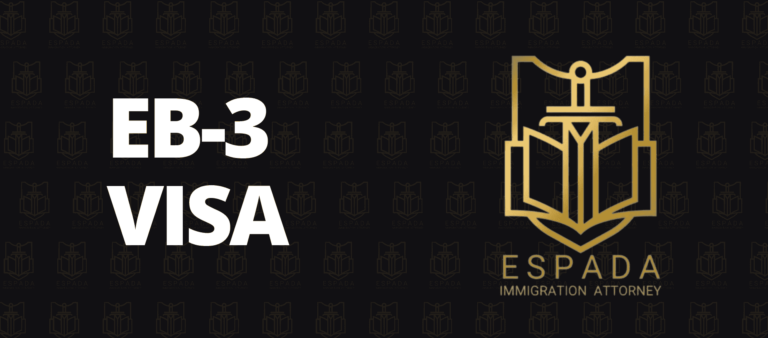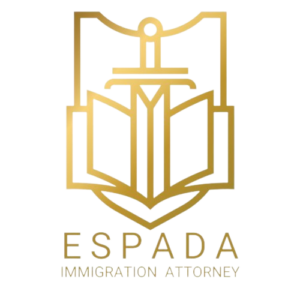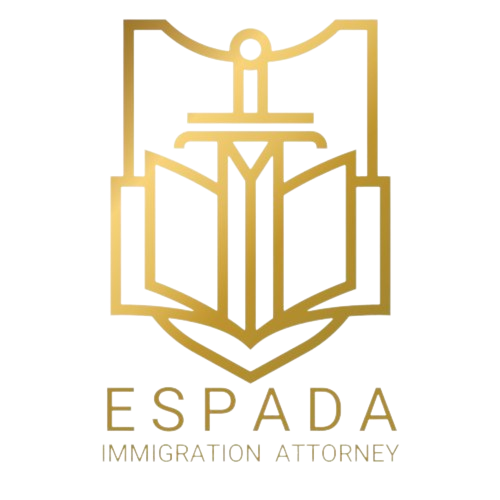EB3 Visa Comprehensive Guide : All You Need to Know
EB3 Visa Comprehensive Guide : All You Need to Know

The EB3 visa provides a pathway for individuals to obtain a green card by being sponsored by a U.S. employer. To secure a green card through this visa category, the sponsoring company must complete the labor certification process, known as PERM.
This guide will provide a detailed overview of the EB3 visa process and explain how you can leverage this visa to gain permanent residency and live in the United States.
If you have any questions, feel free to reach out to me directly at abbas@espadaimmigration.com. I am very responsive to emails and would be glad to assist you.
Overview
- What is the EB3 Visa?
- What are the Benefits of the EB3 Visa?
- What are the EB3 Visa Requirements?
- What is the EB3 Visa Application Process?
- What Documents are Needed to Apply for an EB3 Visa?
- What Forms are Needed to Apply for an EB3 Visa?
- What are the EB3 Visa Fees?
- What is the EB3 Visa Processing Time?
- Conclusion
1. What is the EB3 Visa?
The EB3 visa offers permanent residency (a green card) to individuals who qualify as skilled workers, unskilled workers, or professionals. Each year, approximately 40,000 EB3 visas are issued.
As a third-preference employment-based visa, the EB3 has less stringent eligibility criteria compared to EB1 and EB2 visas. However, this often results in longer processing and wait times. Currently, 28.6% of employment-based green cards are reserved for EB3 visas, which equates to roughly 40,000 approvals annually. Additionally, a cap restricts each country to no more than 7% of these visas, meaning applicants from countries with a high volume of requests—such as India and China—may experience longer delays.
While the U.S. fiscal year begins on October 1, there’s no specific advantage to submitting your EB3 application during a particular time of the year. You can apply at any point. Like most green cards, the EB3 visa is valid for 10 years and can be renewed as needed.
My team and I are here to answer any questions about the EB3 visa and provide assistance with the application process for both petitioners and beneficiaries.
2. What are the Benefits of the EB3 Visa?
The EB3 visa offers numerous advantages. Some of the key benefits include:
Permanent Residency in the U.S.
The EB3 visa grants permanent resident status, which comes with several advantages. As a permanent resident, you have the flexibility to change employers, travel more freely, and enjoy many of the same rights as U.S. citizens.
Less Stringent Requirements
Compared to EB1 and EB2 visas, the EB3 visa has more lenient eligibility criteria. This makes it an excellent option for individuals who may not meet the qualifications for higher preference categories.
Family Accompaniment
Your spouse and dependent children can join you in the United States under the EB3 visa. Dependent children include unmarried individuals under 21 years old. While in the U.S., your children can attend school, and your spouse can work after obtaining their Employment Authorization Document or green card.
3. What are the EB3 Visa Requirements?
To qualify for an EB3 visa, you must meet specific requirements. Below are the conditions that need to be satisfied. My team and I can assist in determining whether you meet these criteria.
Eligibility Based on Employment Criteria
The EB3 visa is available for:
- Professionals: Individuals with a bachelor’s degree or its equivalent working in positions that require such a qualification. Note that experience or alternative education cannot be used as a substitute for this degree.
- Skilled Workers: Applicants with at least two years of job training or relevant experience.
- Unskilled Workers: Those performing roles requiring less than two years of training, provided these jobs are permanent in nature.
Proof of No Qualified U.S. Workers
Your EB3 visa cannot negatively impact U.S. workers. This means the position you are applying for must be one that no qualified American worker is able or willing to perform. To meet this criterion, you need an approved labor certification, which I’ll explain in detail later.
Valid Job Offer
A U.S. employer must extend a legitimate job offer to sponsor the beneficiary. This employer must demonstrate through the labor certification process that no qualified American workers are available to fill the position. Additionally, the employer must establish a valid employer-employee relationship with the foreign worker, which includes the ability to pay and supervise them.
4. What is the EB3 Visa Application Process?
The EB3 visa application process consists of several key steps. Below is a breakdown of these steps, followed by a detailed explanation of each. If you need additional clarification or assistance, my team and I are happy to help guide you through this process.
- Labor Certification
- I-140 Petition
- Form DS-261
- Medical Examination
- Visa Application
- Visa Interview
- Arrival in the United States
Labor Certification
The first step of the EB3 visa process is carried out by the U.S. employer. They must obtain a labor certification from the Department of Labor (DOL) after applying for a prevailing wage determination.
The labor certification ensures that:
- There are no qualified U.S. workers available for the job.
- The employer agrees to pay the beneficiary the prevailing wage determined by the DOL.
This is achieved by submitting Form ETA-9089 to the DOL. This form provides details about the employer, job duties, wages, beneficiary, and, if applicable, the attorney or representative handling the application.
The employer must also demonstrate that active recruitment efforts were made to fill the position with a U.S. worker. This includes placing job orders with the State Workforce Agency (SWA) and advertising in professional journals, newspapers, online job boards, job fairs, campus recruitment events, or through other industry-specific avenues.
An approved labor certification is a prerequisite for filing the I-140 petition with USCIS.
I-140 Petition
After obtaining the labor certification, the U.S. employer can submit the Form I-140 petition to the U.S. Citizenship and Immigration Services (USCIS). This petition must detail the job, employer, and beneficiary’s qualifications, and include evidence of the employer’s ability to pay the offered wage.
If the petition is denied, the beneficiary will not be eligible for the EB3 visa. However, if the I-140 petition is approved, the case is forwarded to the National Visa Center (NVC) for further processing if the applicant is outside the U.S.
The NVC will assign a priority date, which determines when the applicant can proceed based on annual visa limits. Applicants must wait for their priority date to become current before moving to the next steps.
Form DS-261
Once the priority date is current, the beneficiary must complete Form DS-261, the Online Choice of Address and Agent. This form informs the U.S. Embassy or Consulate in the beneficiary’s home country about their visa application. A confirmation notice will be issued upon processing, which is required to schedule a visa interview.
Medical Examination
The beneficiary must undergo a medical examination through an NVC-approved physician. The examination ensures the applicant is in good health, has the required vaccinations, and meets medical eligibility standards for entering the U.S.
Visa Application
After receiving the confirmation notice for Form DS-261, the beneficiary must submit the following documents to their local U.S. Embassy or Consulate:
- Approved labor certification
- Approved I-140 petition
- Approved DS-261
- Valid passport
- Medical examination results
- Job contract
- Academic credentials
- Resume
- Criminal records (if applicable)
- Recent photograph
Additional documents may be requested by the NVC based on the individual case. Once all documents are submitted, the applicant can schedule a visa interview.
Visa Interview
The applicant will attend an interview with a U.S. consular officer. During this meeting, the officer will review the submitted documents and ask questions about the applicant’s background and job in the U.S. The officer’s evaluation will determine whether the EB3 visa is approved.
Arrival in the United States
If the visa application is approved, the beneficiary will receive an EB3 visa, granting them permanent residency. This allows the individual to live and work in the U.S. with the rights and responsibilities of a green card holder.
5. What Documents Are Required for the EB3 Visa Application Process?
The EB3 visa application process requires various documents, depending on your specific circumstances. Below is a general list of documents commonly needed. However, you might not need all of these, or additional documents could be necessary for your case. My team and I can assist in identifying the appropriate documentation for your application.
It’s important to retain copies of all documents you submit and keep them for at least three years. This is because some cases are subject to audits, which can occur randomly, requiring you to provide your documentation.
- A written contract between the U.S. employer and the beneficiary
- Valid passports for the beneficiary and any dependents
- Photographs
- Medical and vaccination records
- Academic records
- Documentation of previous work experience
- Criminal background checks
- Proof of significant awards or honors
6. What Forms Are Required for the EB3 Visa Application Process?
Several forms are essential during the EB3 visa application process. These forms are explained briefly below. My team and I are available to provide additional details and assistance with preparing these forms.
Form ETA-9089
Form ETA-9089, the Application for Permanent Employment Certification, must first be approved by the Department of Labor (DOL). This form provides information about the employer, job position, and beneficiary. It ensures that hiring the foreign worker does not harm American workers and guarantees fair treatment of the beneficiary in the United States. Without DOL approval of this form, the EB3 visa application cannot proceed.
Form I-140
Form I-140, the Immigrant Petition for Alien Workers, is the petition submitted to USCIS to establish eligibility for the EB3 visa. This form contains details about the petitioner (employer), the beneficiary (employee), and the job offered.
Form DS-261
Form DS-261, the Online Choice of Address and Agent, is filed by the beneficiary to notify the U.S. Embassy of your intention to proceed with the visa application. Once you submit this form, you must wait for confirmation before continuing the process.
7. What Are the EB3 Visa Fees?
The EB3 visa process involves multiple fees. As of the current publication date, the fees are as follows, but these may change over time. It’s also important to confirm who is responsible for covering specific fees—the employer or the beneficiary.
- I-140 Petition Filing Fee: $700
- DS-261 Processing Fee: $445
- Additional Fees: Costs for medical exams, document translations, photocopying, and other expenses vary depending on individual circumstances.
8. What Is the EB3 Visa Processing Time?
The processing time for the EB3 visa varies based on several factors, including the USCIS service center processing the case, the applicant’s country of origin, and the specifics of the application. Processing times can range from approximately one year to several years. Applicants from countries like India and China may face extended waiting periods due to high demand. For a more tailored estimate, my team can evaluate your case and provide guidance.
9. Conclusion
The EB3 visa offers a pathway to permanent residency for eligible individuals. By now, you should have a clearer understanding of the EB3 visa’s benefits, requirements, and application process.
If you have further questions about any aspect of the EB3 visa or need personalized assistance, feel free to contact me directly at abbas@espadaimmigration.com. My team and I are ready to provide the support you need.
Why Choose Us
Choosing the right immigration lawyer can make all the difference in achieving your U.S. immigration goals. At Espada Immigration Lawyer, we are dedicated to providing exceptional legal guidance and personalized support through every step of the process. Our team combines specialized expertise, transparency, and an unwavering commitment to client success, making us a trusted partner for all your immigration needs.
- Specialized Expertise
- Personalized Approach
- Transparent Guidance
- Client-Centered Commitment

DISCLAIMER: This article is provided for general informational purposes only and does not constitute legal advice. The information herein should not be interpreted as formal legal counsel nor does it establish an attorney-client relationship. This article is neither intended as a solicitation for legal services nor as a substitute for individual legal advice. For specific legal guidance, please consult an attorney in your jurisdiction. Actions based on information in this article are taken at your own risk, and I disclaim any liability for such actions. Please note that information may have changed since publication and may no longer be current. This article does not offer guarantees, warranties, or predictions regarding the outcome of any legal matters. Each case is unique, and results will depend on individual facts and legal issues. Thank you.
ATTORNEY ADVERTISING: Any invitation to contact our law firm on this website and related pages constitutes attorney advertising.
